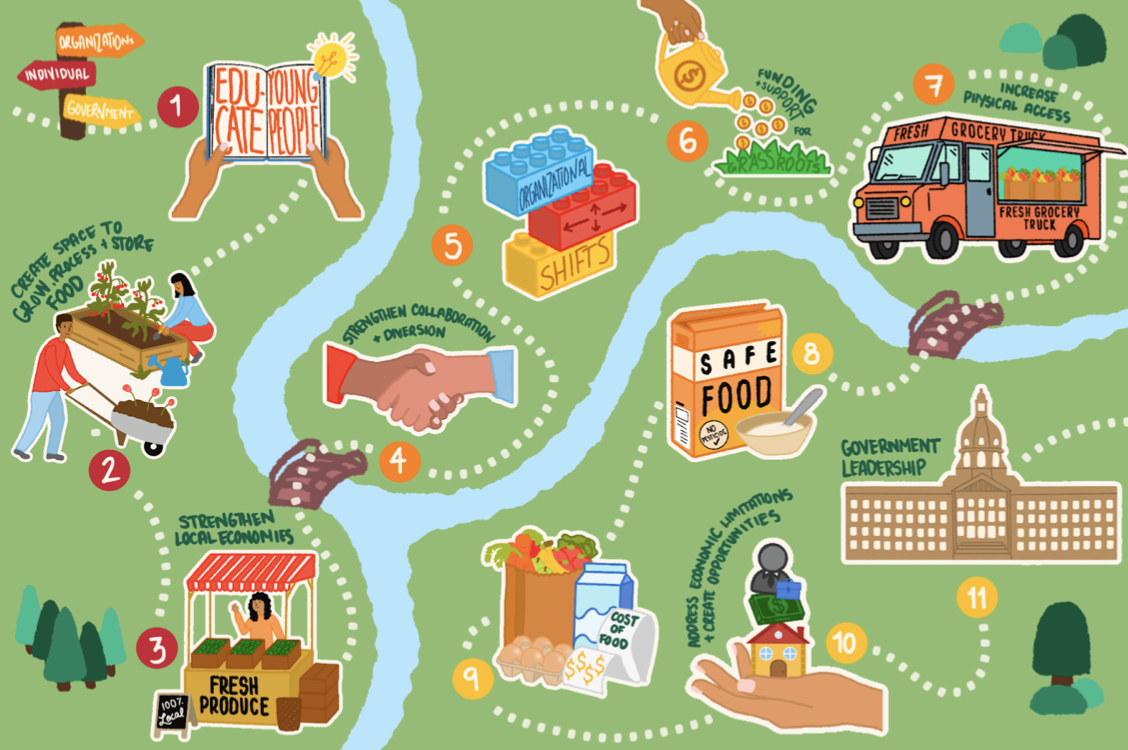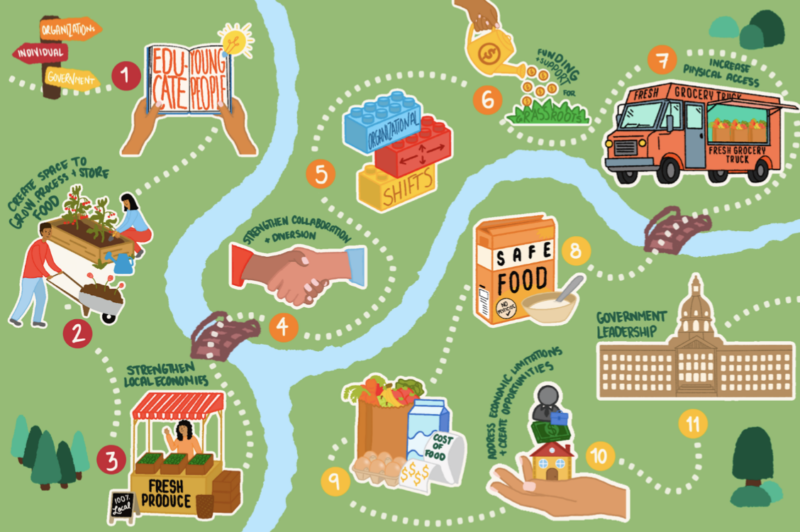Relations with Food: Calls to Action Trail Map
Sources:
John Humphrey Centre and Righting Relations (Designed by Esther Dimalanta)
Rights of Use:
CC-BY-NC-SA


Take a journey through the Righting Our Relations with Food: Calls to Action Trail Map
In the summer of 2020, the West Hub of Righting Relations (constituted by partner agencies and individuals from Alberta, Saskatchewan and Manitoba) conducted outreach across the country through the Righting Relations National Network to gather thoughts and perspectives on food security across the country to provide inspiration for education and advocacy on how we can collectively innovate to shift our food systems. These are 11 calls to action that emerged from our learnings:
1. Educate Young People
Schools are a critical place to learn skills and knowledge on food and food systems. Prioritizing education and practical skills in schools is fundamental for generational and sustainable changes and could have generational impacts on both food security and climate change.
2. Create Space to Grow, Process & Store Food
The ability to grow and prepare food is foundational to achieving the SDGs. This ranges from having access to land to grow food; knowing how to harvest, prepare and process foods; support for small family farms; and finding a better work-life balance in order to have the time and capacity to grow.
3. Strengthen Local Economies
We need to find ways to work with local producers to make local healthy food more affordable and accessible for people who have insecure income.
4. Strengthen Collaboration & Diversion
Collaboration is necessary to reduce food waste and divert to those in need. Municipalities could consider a mandatory bylaw that requires usable food to be distributed to social agencies.
5. Organizational Culture Shifts
Rules and regulations among service agencies act as barriers to food access and security. Decolonizing efforts need to happen that facilitate organizational shifts that address ongoing racism and ableism.
6. Appropriate Funding & Support to Grassroots
Increasing funding and decreasing bureaucracy to food resources will go far in supporting grassroots organizations who are most connected to the vulnerable and able to appropriately respond to community needs. Indigenous leadership should be cultivated and should provide guidance to decision-makers. Building a network of collaboration among grassroots will help strengthen community voices and ensure relevant solutions.
7. Increase Physical Accessibility
Increasing accessibility to transit, neighbourhood level access points, and delivery options for food should be a priority in communities, particularly to support those most marginalized such as those living with disabilities, seniors and single moms.
8. Safe Food
Access to safe food is a concern with suggestions made to strengthen nutritional information on labelling, and to move towards supporting local and small farmers in order to depart from “conventional agriculture” which insists on using chemical fertilizers and pesticides, insecticides, herbicides and desiccants which contaminate food supply.
9. Address the Cost of Food
The costs of food are high and rising, particularly healthy nutritious food. Restricted diets such as gluten free, low sugar and reduced salt need to be more reasonably priced and accessible. Government needs to centre attention to controls and/or subsidies to ensure stability in prices.
10. Address Economic Limitations & Create Opportunities
Current income support levels do not enable one to pay bills, rent and buy food. People receiving income support often find themselves having to choose between paying bills, paying rent or buying food; let alone covering any medications or other needs they may have. Strengthening income supports and creating opportunities to engage in the economy are essential.
11. Government Leadership
All levels of government have a responsibility to apply a human rights lens to the challenges of poverty and food insecurity. This requires that each level should have a food security strategy and charters in place that does not rely solely on food banks and charity. Both provincial and federal governments need to work together to ensure a liveable guaranteed basic income.
Posted Under:
advocacy, calls to action, Canada, food, food insecurity, food sovereignty, Graphics, human rights, National, Original Content, Readings, Reports, SDGs, social change, Western Hub